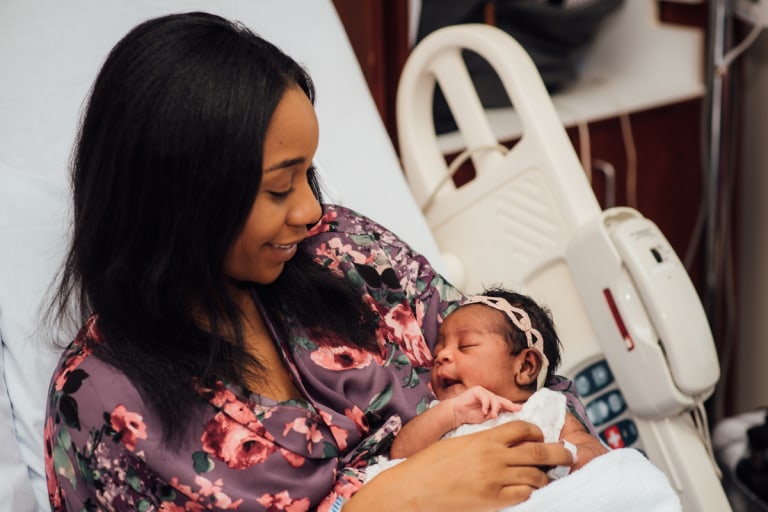
‘Natural Birth’ is Outdated: All Birth is Natural
Erica Chidi, CEO of LOOM, explains why we need to get rid of the term “natural birth.”

By Babylist Staff
I don’t believe in the term “natural birth.” Working as a doula for many years, I helped in countless births—medicated and unmedicated, vaginal and cesarean—and they were all natural. What’s more natural than bringing a baby into the world?
Of course, when people say “natural birth,” they typically mean “unmedicated vaginal birth.” But there’s nothing unnatural about managing pain during labor. That’s why LOOM’s online pregnancy and postpartum program gently walks pregnant folks through all of their labor options, without any judgment. We teach that all choices are equal, and so are all births.
Outside our program, though, this phrase is still wildly popular, and it’s time to do away with it for good. “Natural birth” not only has a troubling history, but it harms people’s experiences of labor. Let me explain.
How “natural birth” took off
The term was promoted in the 1940s by the obstetrician Grantly Dick-Read, a eugenicist who worried about the decline of white birth rates. As Amy Tuteur explains in Push Back: Guilt in the Age of Natural Parenting, Dick-Read believed that white women were failing to fulfill their “biological purpose” as mothers, in part because they were taught to fear childbirth. Dick-Read’s bogus theory was that the pain of labor was all in women’s heads.
Despite the racist and sexist roots of “natural birth,” the concept took off in the 1960s as part of a pushback against the medicalization of childbirth. This celebration of “natural childbirth” helped expand women’s sense of choice around labor, but it continues to be a problematic concept.
Why it’s a problem
“Natural birth” is a vague, non-medical idea. It doesn’t refer to any specific kinds of birth (in other words, vaginal, cesarean, medicated or unmedicated). At the same time, the phrase delivers a truckload of judgment. It suggests that some births are natural, while others are somehow weird or unfortunate. This creates a false hierarchy, where some labor experiences are cast as better than others, and it divides birthing people, creating a sense of competition.
The truth is there are all sorts of ways of getting support in childbirth—from an epidural to the reassuring words of a partner. It’s “natural” for pregnant folks to make informed decisions about birthing preferences that feel best to them, whether it’s a homebirth with a doula or a planned cesarean in a hospital. The question is, what feels natural, or right for you?
What to say instead
Try saying exactly what you mean. If there’s an epidural involved, you might call it “medicated birth.” If there isn’t, how about “unmedicated birth”? You can also refer to a “vaginal birth” or “cesarean birth.” There’s no need to bring in ideas of “natural” and “unnatural.” Instead of using vague and emotionally charged language, speak to the facts without judgment.
These simple language choices can change our entire relationship to the labor experience. When we treat all birth as natural, we create space for pregnant folks to listen to their own bodies with love and compassion. Wherever your birth experience takes you, it will be natural.